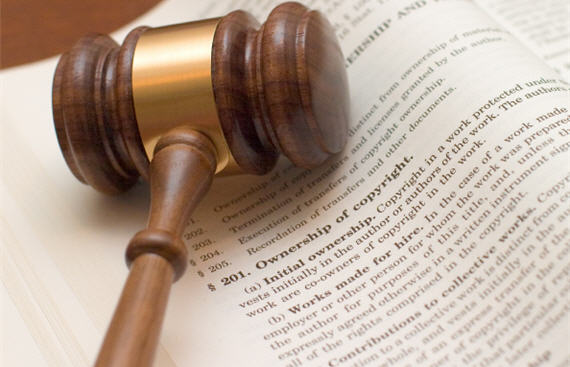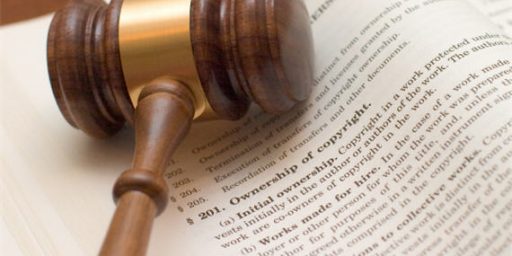The Supreme Court, Copyright Law, and Common Sense
Public interest groups want the Supreme Court to fix our stupid copyright laws.
Public interest groups want the Supreme Court to fix our stupid copyright laws.
EFF (“Public Interest Groups to Supreme Court: Bring Copyright Law In Line With Common Sense“):
EFF—together with Public Knowledge, two national library associations, and U.S. PIRG—submitted a brief [July 9] urging the United States Supreme Court to begin the process of rescuing first sale rights, which have been under assault for decades.
The brief was filed in the case of Wiley v. Kirtsaeng, which turns on the re-sale of textbooks in the U.S. This fall, hundreds of thousands of students will head off to college, ready to fill their heads with knowledge. What they may not realize yet is that they will also be filling the coffers of U.S. textbook publishers, which sell required college texts at exorbitant prices knowing students have little choice but to cough up the cash.
Standing in the way of this tidy scheme is the used textbook market, and that market—not to mention used bookstores, libraries and video rentals—depends on our time-honored first sale doctrine. Under this doctrine, the buyer of a book or any other copyrighted work has the right to dispose of that particular copy as she sees fit.
Unless, according to two appellate courts, those books happened to be manufactured outside of the United States. Due to an obscure provision in U.S. law, those courts have held that the first sale doctrine applies only to works made in the USA. In other words, if copyright owners are crafty enough to outsource the actual manufacture of their works abroad, they can control future redistributions of copies of works that were manufactured abroad, for the entire copyright term.
Our amicus brief urges the United States Supreme Court to reject that interpretation. As we explain, courts are supposed to interpret laws so as to avoid absurd results. Limiting first sale to works made in the United States encourages at least two perverse outcomes: American consumers lose access to affordable used copies of products, and companies move America manufacturing and related jobs overseas. Congress could not have intended these results. What is worse, given that copyrighted works are embedded in all kinds of goods, from refrigerators to watches, the ramifications would reach well beyond the traditional book market.
But this case is important for another reason: it is a chance for the Supreme Court to send a message about the future of first sale rights. Over the past decade, courts and copyright owners have quietly been creating a world in which goods that contain copyrighted works are never truly owned, but only licensed. And those licenses inevitably contain a plethora of legal restrictions on consumers’ ability to fully use those goods. Never mind that the consumer paid for a permanent copy and the seller doesn’t really expect that the buyer ever give it back—the fine print claims to transform a sale into something else.
The public should be watching this case closely. It is an opportunity for the Supreme Court to stand up for common sense and recognize that copyright is supposed to serve the public interest, not the other way around. Let’s hope it does so.
I’m fully on board with EFF and friends on the policy merits of this issue. It simply makes no sense to have a different interpretation of First Sale Doctrine depending on the national original of the materials and the outcome here is perverse for all the reasons outline in the post above and, in a more detailed manner, in the amicus brief [PDF] itself. Further, if this is simply a matter of statutory interpretation—deciding whether Congress intended this loophole in the law—then the arguments here are perfectly useful in helping the Court decide the case.
What piqued my interest, though, we the notion that this case presents “an opportunity for the Supreme Court to stand up for common sense and recognize that copyright is supposed to serve the public interest, not the other way around.” That ain’t the Court’s job. The Constitution specifically authorizes Congress to make laws “To promote the Progress of Science and useful Arts, by securing for limited Times to Authors and Inventors the exclusive Right to their respective Writings and Discoveries.”
It’s up to the Congress to decide the wisdom of the law; the Court’s job is to ensure Congress doesn’t exceed its Constitutional mandate. As always, FindLaw’s Annotated Constitution is an invaluable source for summarizing the history of judicial interpretation of various sections and clauses of the Constitution. While I commend the entire discussion there to those interested in the details, this summary hits the highlights:
[Congress’] power is limited with regard both to subject matter and to the purpose and duration of the rights granted. Only the writings and discoveries of authors and inventors may be protected, and then only to the end of promoting science and the useful arts.
These precedents go back to the 1820s. Nowhere is there a limitation based on the notion that “common sense” must be served. It’s up to the voters, not the unelected judiciary, to decide whether Congress is living up to that standard.
via Julian Sanchez






Ah, but you see “for limited Times” was supposed to balance public and private good.
That “for limited Times” has effectively been thrown out the window is an indication that the court has punted on the balance.
120 years is effectively forever. And that’s the way corporate owners (in the broad sense of that word!) like it.
Related:
Researcher: Optimal copyright term is 14 years
@john personna: Sure. And the Courts surely have the power to interpret whether a limit of 120 years is effectively a limit. They have answered that question in the affirmative multiple times, however, with Ginsburg writing the most salient recent opinion.
@James Joyner:
Your title was “The Supreme Court, Copyright Law, and Common Sense.”
This is the common sense part. 120 years is not an effective limit and does not at all acknowledge economic analysis of optimum term.
@john personna:
Yes but the point is that in this area, as in many others, the Supreme Court has essentially said that it is not the place of the courts to substitute their judgments of what ideal policy is for that of Congress. That much deference may not have been a wise choice, as this area of the law shows.
@Doug Mataconis:
That seems like flexible logic, Doug.
It wasn’t like the Constitution said “perpetual rights” or even “arbitrary rights.”
They said “for limited Times” … and for some reason now that is totally waved away.
(Now in terms of democracy, I do have some hope that the fully digital generation will change Copyright, but for it to happen a kid who grew up with an iPod has to be in Congress.)
@john personna:
Are you accusing lawyers of “flexible logic”? 🙂
The answer one might get from the Court, though, would be that 120 years is a “limited time,” it just happens to be a “limited time” of a rather long duration. Since the Constitution doesn’t specifically say anything about how limited the “limited time” is I am not sure that the Court could legitimately strike down the law on that basis alone.
I agree that our copyright laws are messed up, but that’s largely Congress’s doing and only they can fix it.
Well, I can be sympathetic to the view that Congress ain’t doing anything useful so we’re going to plead our case to somebody else. Of course that’s not how it’s supposed to work (it’s like my kids asking me after mom already said no), but maybe it will get them what they want actually accomplished.
@Doug Mataconis:
To dig into this a little bit more, do you think the court considered why “limited Time” was there?
The only logic of it is the balance of “goods,” right?
Can anyone argue that 120 years is a balance?
I don’t think so. If I am alive today, and a new work is created by me or someone else, it is effectively mine, or closed to me forever. The possibility that anyone might make economic use of it, and expand commerce, after the author has made his profit, is completely closed.
The original goal was (a) a reward and protection for the author, and (b) an expansion of general commerce and knowledge.
Goal “b” is abandoned.
All good point about the courts, but I think “leave it to Congress” is an unsatisfactory answer as no one like Congress, no one trusts Congress, and it’s not readily apparent that they understand the issue enough to be the last word on it.
In the digital world, copying is how things get done. I don’t log-on to the OTB servers and view the same document Doug or James has been typing on. I’m looking at a copy created locally on my machine. Indeed, to read it, I have to copy it first.
Doesn’t seem like the guys in Congress really get that….
As an aside, I made my money in software, with copyrighted works. It wouldn’t be scary for me, in that field, to have copyright as short as 20 years. In that time I’ve made all the money off a creation that I will, and I better have moved on and created something new.
The original Mac was almost 30 years ago now. Would Apple be economically threatened by original Mac clones? Black and white screens, primitive icons, etc? Not at all. Current Ubuntu kicks all over original-Mac and isn’t threatening them.
It’s a pointless lock-out.
@john personna: “It’s a pointless lock-out.”
Nope, not pointless. It’s another giveaway of rights once belonging to the public to giant corporations. Why does copyright extend so long? Because Disney doesn’t want to lose control over Mickey Mouse. And since a company as rich as Disney finds it easy to buy the congressional decisions they want, the only recourse is the Supreme Court. Which, unfortunately, in its current form is a bigger whore to the corporate state than even congress…
The biggest career mistake I ever made, well, apart from becoming a lawyer in the first place, was not starting out with a firm that handles IP work. That’s where the big bucks are. I mean mondo beaucoup dinero money. It’s also a quick ticket from there away from the tyranny of billable hours and into the relative shangri la of in-house corporate counsel work. Sigh.
In any event, EFF, etc. need refresher courses on the relative provinces of the judiciary vs. legislators, we do need better copyright laws, but as bad as the copyright morass is our patent laws even are worse. Much worse. Were I made emperor one of the first things I’d do is to toss out the entire copyright act and the entire patent act and to start anew.
@john personna:
I don’t disagree with your point. However, the Court, across nearly all ideological groups has tended to be very deferential in this area
@Doug Mataconis:
In this case, it is ok to say that both sides do it. The internet will eventually rewrite copyright laws, but only when congressmen who remember downloading music from napster are voted into office.